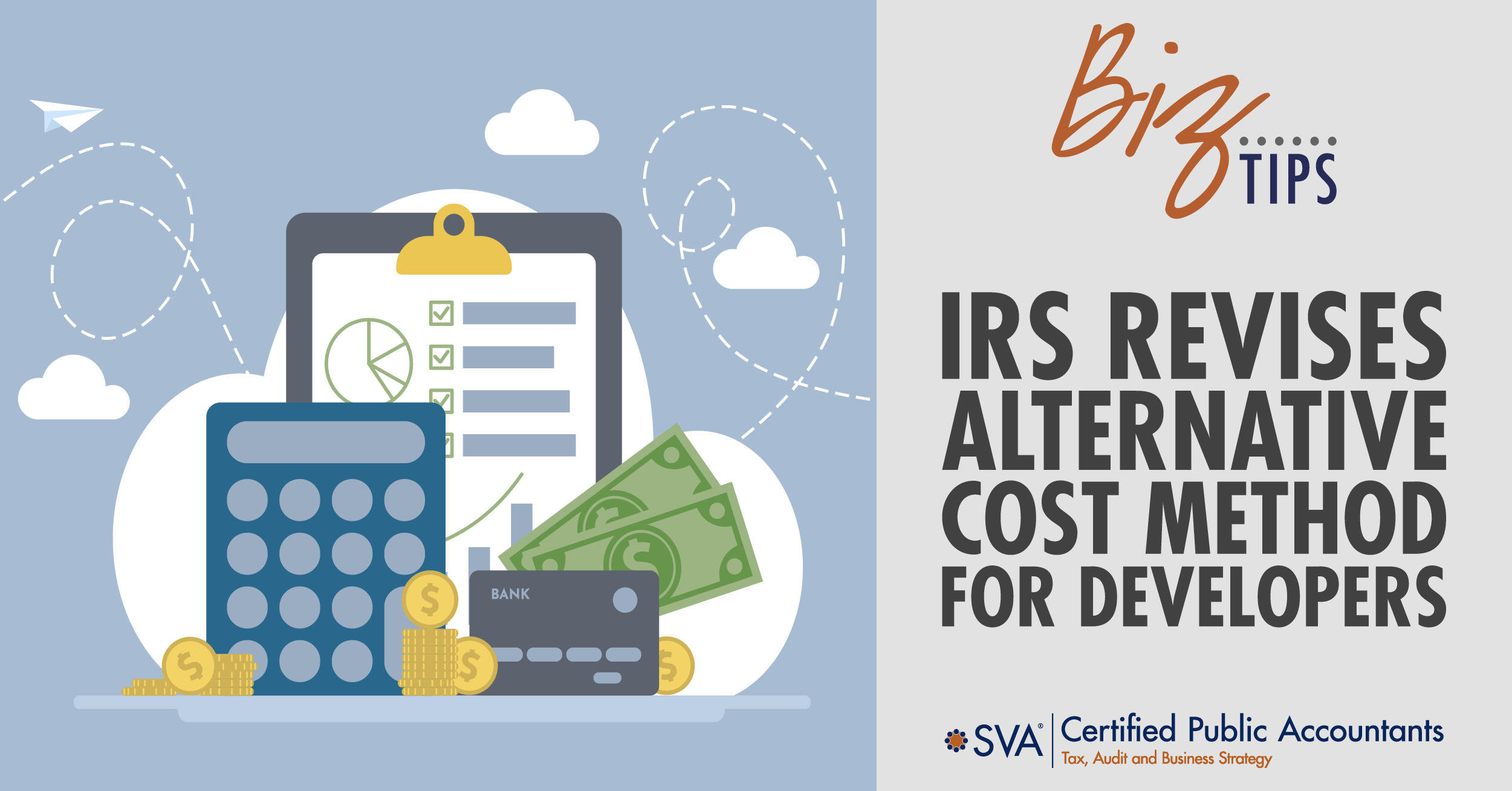Real estate development projects typically take years to reach their final, complete forms. Developers must therefore take a long-term view when it comes to accounting and tax strategies.
A development project is likely to have substantial upfront costs, while revenue might not begin to appear until much later. The project may continue to incur development costs before any revenue is expected.
The Alternative Cost Method (ACM) allows developers to include certain anticipated costs in the property’s tax basis before they actually incur those costs. The IRS recently released new rules and procedures for the use of the ACM by developers.
What is the Alternative Cost Method (ACM)?
The ACM applies to “common improvements.” Eventually, multiple lots will share the benefits of those improvements. Real estate developers are usually obligated, either by law or contract, to make various common improvements such as water and sewer lines, roads, sidewalks, and recreational areas. The developer will allocate a pro-rata share of the total common improvement costs to each lot.
Under normal circumstances, a developer would use the accrual method of accounting to report common improvement expenses. This means that they would not be able to deduct or capitalize those expenses until they incur them.
Section 461(h) of the Internal Revenue Code (IRC) addresses tax accounting for “certain liabilities not incurred before economic performance.” A developer might know that they will have to spend a specific amount of money on roads, sidewalks, and a swimming pool, but the accrual method will not allow them to deduct those costs until they actually incur them.
Sections 446 and 481 of the IRC allow taxpayers to use a different method of accounting if allowed by the IRS. The ACM is one of those methods.
It allows developers to include those future common development costs in the tax basis of any lots or parcels that they sell before incurring the future costs, provided they meet certain requirements. Two of the main criteria for the ACM are as follows:
- The primary purpose of the future common improvement expenses is to promote the sale of lots, parcels, or units.
- The developer will not retain an excessive amount of ownership or control of those improvements.
The maximum amount a developer can deduct through the ACM is the lesser of either:
- The amount of current and future common improvement costs allocated to the lots, parcels, or units being sold.
- The total amount spent on common improvements during the tax year.
What is the New Alternative Cost Method Procedure?
The IRS recently changed its rules regarding the ACM.
Prior to tax year 2023, developers had to follow the procedures established in Rev. Proc. 92-29 more than 30 years ago. These procedures, as the IRS has now acknowledged, imposed burdensome requirements on developers. They had to submit separate requests for each project with detailed information about the project and how they calculated the future common improvement costs.
If the IRS approved a request to use the ACM method for a project, the developer would have to file annual reports with further details about the project.
Rev. Proc. 2023-9, issued by the IRS on January 27, 2023, changes the procedures for the ACM for tax years starting after December 22, 2022. Instead of a mountain of paperwork for each project, a developer can use a single form to request to use the ACM for every project in its portfolio that qualifies. If the IRS approves the request, the developer must use the ACM for every qualifying project they have.
How Does the Alternative Cost Method Work?
Suppose a developer has a project that involves subdividing a parcel of land into 20 lots of identical size and quality. The project will take five years to complete. The developer incurs $1 million in common improvement costs during the first year. The amount of costs allocated to each lot is therefore $50,000.
The developer is contractually and legally obligated to provide another $2 million in common improvements over the course of the project. The eventual total amount of common improvement costs allocable to each lot will be $150,000, or $3 million divided by 20.
If the developer sells five lots at the end of the first year, the accrual method would only allow them to deduct $50,000 for each lot, for a total of $250,000. The developer would effectively lose the deduction for those lots’ shares of the rest of the common improvement costs. Out of $1 million spent, it could only deduct $250,000.
The full amount of the five lots’ shares of common improvement costs would be $750,000, or $150,000 times five. The ACM would allow the developer to deduct this amount during the first year.
Note that IRS rules limit the amount of the ACM deduction to the total amount spent during the year on common improvements. If, in the current example, the developer sold 10 lots during the first year, the total allocable common improvement costs would be $1.5 million. Since the developer only spent $1 million that year, that would be all they could deduct.
If you have any questions or would like additional information, contact one of our real estate accounting professionals.

© 2023 CPA ContentPlus

